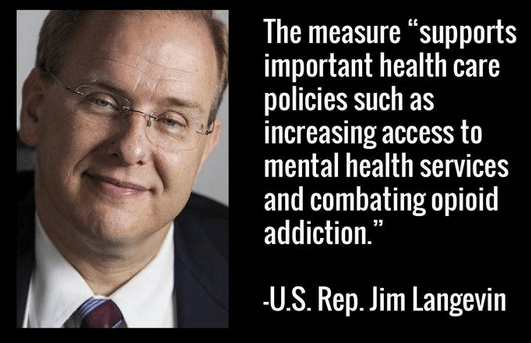By Alan FramThe Associated Press
WASHINGTON — The House easily approved a sweeping biomedical bill Wednesday that would help drug and medical device companies win swifter government approval of their products, boost disease research and drug-abuse spending and revamp federal mental health programs.
The compromise, which envisions spending $6.3 billion over the next decade, was condemned by consumer groups and some Democrats as a present to drug makers that promised only paltry spending increases for underfunded federal programs.
But their objections were overwhelmed by an alliance among Republicans, many Democrats and the White House for a 996-page measure that bore wins for both parties. The Senate’s expected final approval next week would mark an uncommon episode of cooperation between the GOP-run 114th Congress — which plans to adjourn next week — and President Barack Obama in their dwindling days in office.
The vote was 392-26.
Rhode Island Reps. Jim Langevin and David Cicilline, both Democrats, voted to approve the measure.
“The 21st Century Cures Act makes crucial investments in innovation and medical research, including the Cancer Moonshot and BRAIN Initiatives, and it supports important health care policies such as increasing access to mental health services and combating opioid addiction,” Langevin said.
“I am especially pleased that the bill includes language from legislation I introduced with Congressman Gregg Harper to improve medical rehabilitation research and coordination at the National Institutes of Health. After becoming paralyzed at the age of 16, I required intensive rehabilitation in order to navigate my new lifestyle, an experience that is shared by so many Americans with disabilities, traumatic injuries, and chronic conditions.”
But he added: “… the 21st Century Cures Act is by no means a perfect bill. It strips away funding from the Public Health Prevention Fund, undermining our efforts to fight the very diseases we are attempting to cure. And although this legislation streamlines the FDA drug and device approval process, we must ensure that these reforms do not compromise patient safety.
“Finally, this bill does nothing to reign in the skyrocketing costs of prescription drugs, an issue that has seriously impacted Rhode Island families. I look forward to working with my colleagues to ensure that these issues receive the attention they deserve and are properly addressed going forward.”
Rep. Fred Upton, R-Mich., chairman of the House Energy and Commerce Committee and an author of the legislation, said: “We are on the cusp of something special, a once-in-a-generation opportunity to transform how we treat disease,” said
Not everyone agreed.
Rep. Rose DeLauro, D-Conn., said that while the bill contained “noble goals that I share,” its relaxation of some standards for federal drug approvals was dangerous and “neglects the very people clinical trials are meant to help, that is the patients.”
No. 2 Senate Democratic leader Richard Durbin, of Illinois, said he was “totally underwhelmed” by the bill’s extra money, and said its cuts in a disease prevention fund created under Obama’s health care law to finance new medical research displayed “a warped sense of justice.”
Democratic hopes — and leverage — for winning more money and consumer protections faded with Republican Donald Trump’s presidential election triumph. Senate Majority Leader Mitch McConnell, R-Ky., flatly said his chamber will send the measure to Obama, and Durbin said he expected Senate passage.
In a written statement, White House spokesman Josh Earnest said the bill “is not perfect” but contains “advances in health that far outweigh these concerns.” He said the Senate should approve it quickly.
The bill includes an additional $4.8 billion over the next 10 years for the National Institutes of Health. The medical research agency spends around $32 billion annually, and supporters complain that spending cuts imposed by Congress and rising research costs mean its budget has eroded in value since the early 2000s.
“A couple billion dollars doesn’t go very far in cancer research” over 10 years, said Lisa Plymate, a director of the liberal-leaning National Physicians Alliance.
Much of the NIH money would be for Obama’s precision medicine initiative, aimed at tailoring drugs for people’s genes and lifestyles, and research on cancer, a focus of Vice President Joe Biden, whose son Beau died of the disease in 2015.
The Food and Drug Administration would get $500 million to streamline approval processes for drugs and medical devices.
States would get $1 billion over the next two years for preventing and treating abuse of addictive drugs like opioids, a problem that is surging in GOP and Democratic represented communities around the country.




